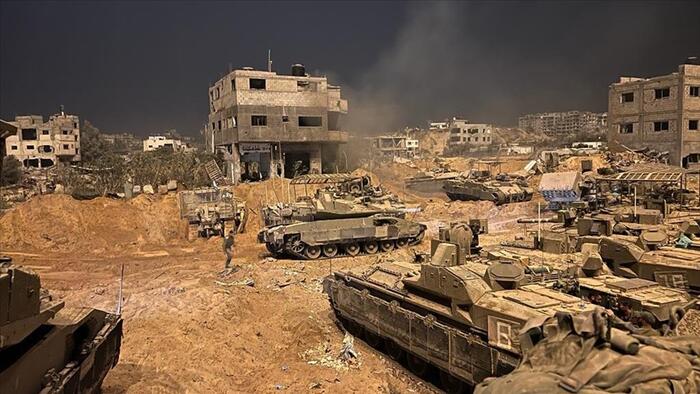


In the past Israel relied on its weapons superiority to dissuade potential attacks from neighbors, but that gap is obviously narrowing, as the massive Iranian retaliatory missile strikes on Tel Aviv and other cities demonstrated last June. Lessons from Ukraine should also be taken into account, as Israeli armor might not have the same battlefield presence it once did if cheap drones are so effective in destroying vastly more expensive tanks.
While the superior-armed IDF military has clearly been pushing forward in Gaza, as the war is soon to reach the two-year mark, Hamas has all the while released a steady stream of battlefield videos showing its militants engaged in successful ambushes. Large IDF tanks have been blown up often by militants sneaking up and placing IEDs directly on them.
The fact that Israel has since Oct.7 been engaging hostile groups from the Houthis of Yemen, to the Iranians, to Hezbollah in Lebanon - has meant a severe strain on public and government coffers. Israel has also frequently bombed Syria, as it did back in the days of Assad, and is now occupying parts of the country's south, well beyond the Golan Heights. All of this also requires more manpower, and steady updates regarding weapons tech, parts, and mechanical upkeep.
Now there are new risks and mounting costs involved, as reservists continued to be called up in the thousands, connected to the effort to fully take over Gaza City - the Strip's most populous location.
New Monday reporting in Bloomberg says that "Israel’s push to take over Gaza City is expected to add 25 billion shekels ($7.5 billion) to the war bill through the end of the year, according to an Israeli government official."
"The added costs — equivalent to more than 1% of Israel’s gross domestic product — will pile onto the 204-billion-shekel military tally for the almost two-year war in Gaza, which spread to Lebanon, Iran, Syria and Yemen," the report continues. That's over $60 billion total.
Additionally the report notes that "Reservists’ salaries, ammunition and missile interceptors make up the bulk of spending, the official said on condition of anonymity to discuss sensitive matters that haven’t been made public."
There are other indirect factors putting an immense strain on funding the war effort, amid Israel's increased global isolation, as CNN writes:
Netanyahu, meanwhile, is calling on Israel’s arms makers to step up their readiness. “We will need to strengthen our independent weapons industries so that we have munitions independence, a defense industrial economy, and the industrial capability to produce them,” he said last Monday, speaking at a finance ministry conference.
Israel and its arms makers have long been viewed as producing cutting-edge weapons technology, and those weapons have been sold to countries around the world. But as international criticism of the war in Gaza grows, Israel risks losing its position in some of those markets.
But the 'special relationship' with Washington will once again form the basis of bailing Israel out, and the Trump White House is already pushing for Congress to approve a nearly $6 billion arms deal with Israel.
The proposed package includes 30 AH-64 Apache attack helicopters valued at $3.8 billion, which would nearly double Israel’s current fleet, as well as 3,250 infantry fighting vehicles - at $1.9 billion.
Trump is said to be deeply frustrated with Prime Minister Netanyahu over the risky Doha operation targeting Hamas leaders earlier this month, but certainly this public stance doesn't square with promise of $6 billion more in weapons. It's yet another example of watch what Trump does and not what he says.
